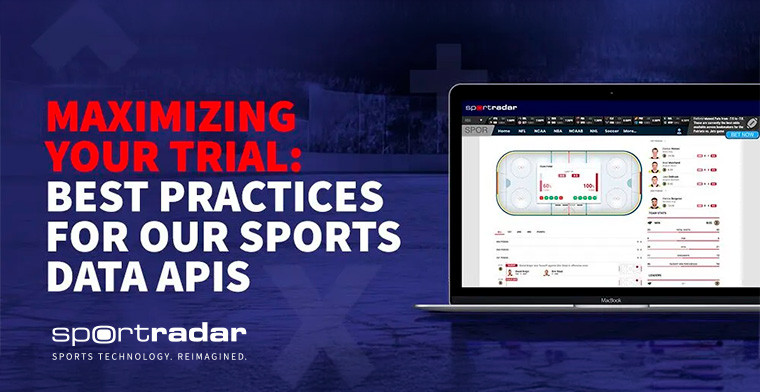Best Practices for Integrating Sportradar’s Sports Data APIs
Monday 05 de August 2024 / 12:00
2 minutos de lectura
(St Gallen).- Welcome to the dynamic world of sports data integration, where Sportradar’s APIs provide unparalleled access to a wealth of information across various sports. Whether you’re developing applications for real-time game updates, building a fantasy app, or showing your customers the latest odds, our APIs are designed to deliver fast, reliable and comprehensive data.

Here’s a quick primer on getting started with our APIs to make the most of your integration.
Kick Off Your Integration with Account Setup
Your journey begins with setting up an account in the Sportradar Developer Portal. Follow our “Make Your First Call Guide“ to create your account, get an API key, and add the products that you want to try. Sportradar’s trials are limited to 30 days, 1,000 total calls, and 1 query per second. For additional access to our APIs, connect with a sales representative.
Mastering the API Structure
Sportradar’s APIs are crafted to cater to the specific needs of different sports, delivered through RESTful or Push endpoints. Here’s what you need to know:
- General Sport APIs: For some sports, you can access multiple leagues within the same endpoint. They will follow a consistent structure for easy integration. For example, the Tennis API gives you access to many different competitions within the same set of endpoints.
- League-Specific APIs: Other APIs are designed with the unique structures of each league in mind, ensuring that you get data specific to the league you are working with. For example, the NFL, UFL, and NCAA Football are each separate APIs, though they will generally follow a lot of the same patterns.
- Data Formats: Our APIs support JSON and XML responses, giving you flexibility based on your application’s requirements.
- Schemas: We provide XML schemas to help you and your application know what data points to expect from each of our XML feeds. We also have OAS (Open API Specifications) available for General Sport APIs.
How to: Data Retrieval 101
Efficient data retrieval is key to integrating sports data seamlessly. Here’s our recommended approach, applicable across various sports:
- Identify Key Endpoints: Start by identifying the key endpoints you’ll need, such as league schedules, player profiles, and match results. Each product’s documentation includes an API map to help you identify these.
- Follow Logical Data Paths: For example, here’s a retrieval path for an NFL player profile:
a. Retrieve a Team ID using the NFL API’s League Hierarchy endpoint.
b. Use that Team ID in the Team Profile endpoint to locate the Player ID.
c. Finally, use the Player ID to request detailed player information from the Player Profile endpoint.
This method ensures a structured data flow, minimizing the number of API calls.
Embrace Versioning
Always use the latest version of our APIs to leverage the most advanced and stable features. For instance, if you use the NFL API, ensure you are on v7. We support up to three versions, depending on the sport/league, to provide flexibility while maintaining stability.
Real-Time Data Integration
For applications requiring real-time updates, Sportradar offers Push feeds alongside RESTful endpoints. Combining these can enhance your application’s performance:
- RESTful Feeds: Use these for comprehensive data retrieval.
- Push Feeds: Employ these for live data streams to minimize latency and reduce API call frequency.
Rate Limits and Efficient Data Caching
Be mindful of the rate limits specified in your account section to avoid service disruptions. Implement data caching strategies using TTL (Time-to-Live) headers. Also, be aware that some APIs may include ‘302 Redirect’ or ‘304 Not Modified’ responses. Be familiar with what types of responses your API may provide by looking through our documentation and testing a variety of scenarios.
Robust Testing and Validation
Before going live, rigorous testing and validation are crucial. Use tools like Postman to simulate API requests and ensure your integration can handle various scenarios, including edge cases and potential downtimes. For select sports, you can test against previously recorded games using simulations.
Leveraging Pagination
While some APIs may not use pagination, understanding how to handle large datasets is crucial. If your specific API does use pagination, ensure you implement it correctly to manage data efficiently. For example, in our Global American Football API Player Mappings endpoint, you must specify via query parameters: the start number, and the limit-size of your results.
Conclusion
Dive into our comprehensive documentation and support resources on the Sportradar Developer Portal to bring the power of real-time sports data to your applications and get in touch if you need any support along the way.
Categoría:Reports
Tags: Sportradar,
País: Switzerland
Región: EMEA
Event
ICE Barcelona 2026
19 de January 2026
R. Franco Digital reinforced its technological leadership at ICE Barcelona 2026 with IRIS Open Omnichannel Platform
(Madrid).- The Spanish iGaming provider advances its omnichannel strategy, highlights regulatory readiness, and showcases new casino titles at the industry’s leading event.
Friday 30 Jan 2026 / 12:00
“The 2026 World Cup Is Forcing a Rethink of How Betting Brands Advertise”- Rodrigo Cambiaghi, Sportradar
(Barcelona, SoloAzar Exclusive).- During ICE Barcelona 2026, where industry leaders gathered to discuss the future of gaming and sports betting, Rodrigo Cambiaghi, Senior Sales Executive for Digital Advertising at Sportradar, shared his perspective on how the 2026 FIFA World Cup is reshaping advertising strategies. In this interview, he explains why real-time data, automation and regulatory alignment are replacing mass exposure, and how major tournaments are accelerating a shift toward more precise, accountable and performance-driven sports advertising.
Friday 30 Jan 2026 / 12:00
Amusnet Marks a Decade of Growth with a High-Impact Presence at ICE Barcelona 2026
(Sofia).- The company combined a landmark anniversary celebration with product innovation, strategic partnerships, and strong business momentum at the industry’s leading event.
Friday 30 Jan 2026 / 12:00
SUSCRIBIRSE
Para suscribirse a nuestro newsletter, complete sus datos
Reciba todo el contenido más reciente en su correo electrónico varias veces al mes.



















